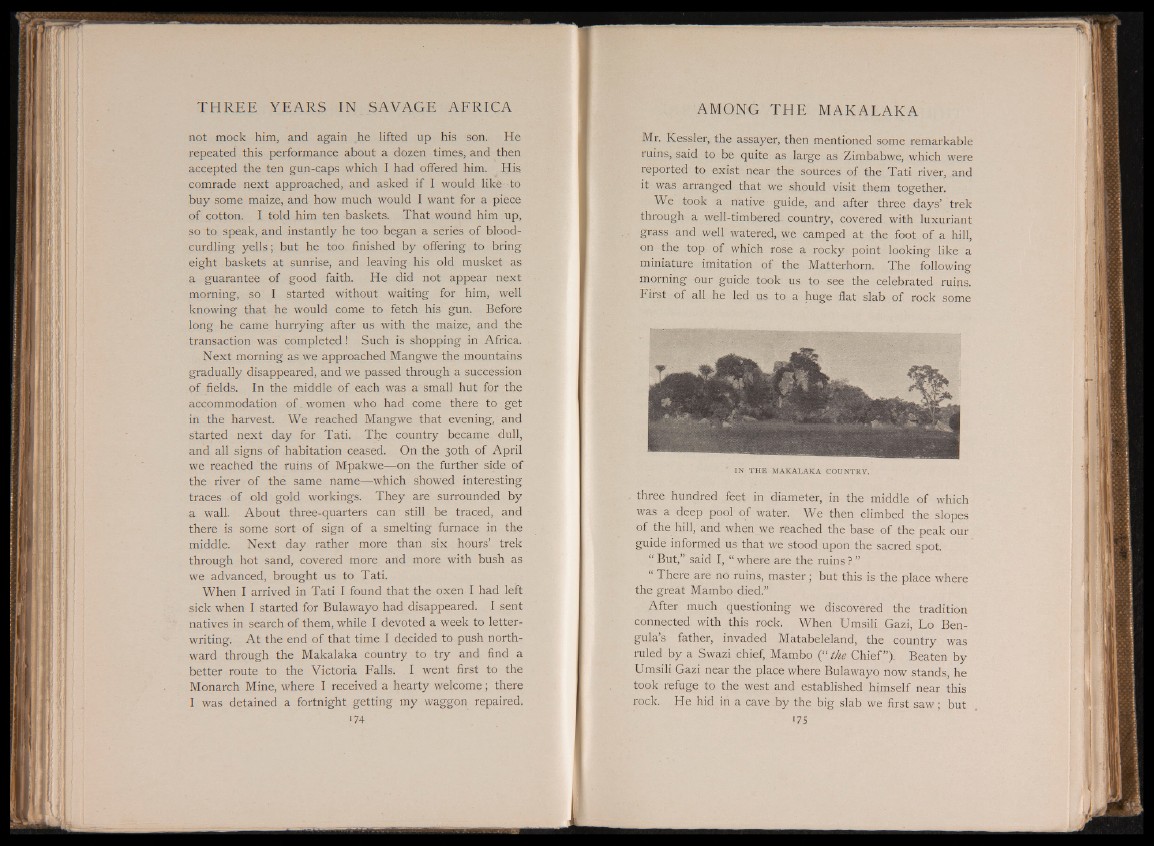
not mock him, and again he lifted up his son. He
repeated this performance about a dozen times, and then
accepted the ten gun-caps which I had offered him. His
comrade next approached, and asked if I would likd -to
buy some maize, and how much would I want for a piece
of cotton. I told him ten baskets. That wound him up,
so to speak, and instantly he too began a series of bloodcurdling
yells; but he too finished by offering to bring
eight baskets at sunrise, and leaving his old musket as
a guarantee of good faith. He did not appear next
morning, so I started without waiting for him, well
knowing that he would come to fetch his gun. Before
long he came hurrying after us with the maize, and the
transaction was completed! Such is shopping in Africa.
Next morning as we approached Mangwe the mountains
gradually disappeared, and we passed through a succession
of fields. In the middle of each was a small hut for the
accommodation o f. women who had come there to get
in the harvest. We reached Mangwe that evening, and
started next day for Tati. The country became dull,
and all signs of habitation ceased. On the 30th of April
we reached the ruins of Mpakwe—on the further side of
the river of the same name—which showed interesting
traces of old gold workings. They are surrounded by
a wall. About three-quarters can still be traced, and
there is some sort of sign of a smelting furnace in the
middle. Next day rather more than six hours’ trek
through hot sand, covered more and more with bush as
w7e advanced, brought us to Tati.
When I arrived in Tati I found that the oxen I had left
sick when I started for Bulawayo had disappeared. I sent
natives in search of them, while I devoted a week to letter-
writing. At the end of that time I decided to push northward
through the Makalaka country to try and find a
better route to the Victoria Falls. I went first to the
Monarch Mine, where I received a hearty welcome; there
I was detained a fortnight getting my waggon repaired.
174
Mr. Kessler, the assayer, then mentioned some remarkable
ruins, said to be quite as large as Zimbabwe, which were
reported to exist near the sources of the Tati river, and
it was arranged that we should visit them together.
We took a native guide, and after three days’ trek
through a well-timbered, country, covered with luxuriant
grass and well watered, we camped at the foot of a hill,
on the top of which rose a rocky point looking like a
miniature imitation of the Matterhorn. The following
morning our guide took us to see the celebrated ruips.
First of all he led us to a huge flat slab of rock some
IN TH E MAKALAKA COUNTRY.
three hundred feet in diameter, in the middle of which
was a deep pool of water. We then climbed the slopes
of the hill, and when we reached the base of the peak our
guide informed us that we stood upon the sacred spot.
“ But,” said I, “ where are the ruins ? ”
“ There are no ruins, master; but this is the place where
the great Mambo died.”
After much questioning we discovered the tradition
connected with this rock. When Umsili Gazi, Lo Ben-
gula’s father, invaded Matabeleland, the country was
ruled by a Swazi chief, Mambo (“ the Chief”). Beaten by
Umsili Gazi near the place where Bulawayo now stands, he
took refuge to the west and established himself near this
rock. He hid in a cave by the big slab we first saw; but
i75